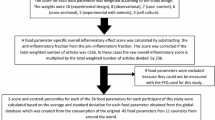Abstract
Life-long bowel habits of 685 colorectal cancer cases and 723 age/sex frequency matched community controls were investigated as one part of a large, comprehensive, population-based study of colorectal cancer incidence, etiology, and survival, The Melbourne Colorectal Cancer Study. Self-reported chronic constipation was statistically significantly more common in cases than in controls (P=.05). Three or more bowel actions per day were reported by more cases than controls but the total number of respondents in this subset consisted of only ten cases and two controls. Otherwise, the frequency and consistency of bowel motions was similarly distributed among cases and controls. Constipation disappeared as a significant risk when simultaneously adjusted for previously determined dietary risk factors, indicating that it is the diet and not the constipation that is associated with the risk of large-bowel cancer. Additionally, a highly statistically significant association (P=.02) was found with the risk of colorectal cancer in those who reported constipation and also had a high fat intake, a finding consistent with current hypotheses of colorectal carcinogenesis. It is concluded that chronic constipation, diarrhea, and the frequency and consistency of bowel motions, as well as laxative use, are unlikely to be etiologic factors in the development of colorectal cancer. Self-reported chronic constipation is a marginally significant indicator of excess risk of large-bowel cancer and may be used as one of the indices in the screening of individuals for this cancer.
Similar content being viewed by others
References
Kune GA, Kune S. The Melbourne Colorectal Cancer Study: a description of the investigation. University of Melbourne, Department of Surgery. Repatriation General Hospital publication (ISBN 0 86839 596 X), 1986:1–31.
Kune GA, Kune S. A new design to examine colorectal cancer cause and survival. Dig Surg 1987;4:156–9.
Cummings JH, Branch WJ. Postulated mechanisms whereby fiber may protect against large bowel cancer. In: Vahouny GV, Kritchevsky D, eds. Dietary fiber in health and disease. New York: Plenum, 1982:313–25.
Correa P, Haenszel W. The epidemiology of large-bowel cancer. Adv Cancer Res 1978;26:1–141.
Kune S. An epidemiological study of colorectal cancer (PhD dissertation, University of Melbourne, 1985). Ann Arbor: University Microfilms International, 1986;8608980:1–407.
Kune S, Kune GA, Watson L. The Melbourne Colorectal Cancer Study: incidence findings by age, sex, site, migrants and religion. Int J Epidemiol 1986;15:483–93.
Breslow NE, Day NE. Statistical methods in cancer research, Vol. I. The analysis of case control studies. Lyon: IARC Scientific Publications, 1980;32.
Baker RJ, Nelder JA. The GLIM system. Release 3. Oxford: Numerical Algorithm Group, 1978.
SPSSx user's guide. New York: McGraw-Hill, 1983.
Connell AM, Hilton C, Irvine G, Lennard-Jones JE, Misiewicz JJ. Variation of bowel habit in two population samples. Br Med J 1965;2:1095–9.
Dent OF, Goulston KJ, Zubrzycki J, Chapuis PH. Bowel symptoms in an apparently well population. Dis Colon Rectum 1986;29:243–7.
Kune S, Kune GA, Watson LF. Case-control study of dietary etiological factors: The Melbourne Colorectal Cancer Study. Nutr Cancer 1987;9:21–42.
Pernu J. An epidemiological study on cancer of the digestive organs and respiratory system: a study based on 7078 cases. Ann Intern Med Fenn 1960;49(suppl 33):1–117.
Wynder EL, Shigematsu T. Environmental factors of cancer of the colon and rectum. Cancer 1967;20:1520–60.
Wynder EL, Kajitani T, Ishikawa S, Dodo H, Takano A. Environmental factors of cancer of the colon and rectum. II. Japanese epidemiological data. Cancer 1969;23:1210–20.
Dales LG, Friedman GD, Ury HK, Grossman S, Williams SR. A case-control study of relationships of diet and other traits to colorectal cancer in American blacks. Am J Epidemiol 1979;109: 132–44.
Jain M, Cook GM, David FG, Grace MG, Hower GR, Miller AB. A case control study of diet and colorectal cancer. Int J Cancer 1980;26:757–68.
Vobecky J, Caro J, Devroede G. A case-control study of risk factors for large bowel carcinoma. Cancer 1983;51:1958–63.
Wu AH, Paganini-Hill A, Ross RK, Henderson BE. Alcohol, physical activity and other risk factors for colorectal cancer: a prospective study. Br J Cancer 1987;55:687–94.
Boyd JT, Doll R. Gastro-intestinal cancer and the use of liquid paraffin. Br J Cancer 1954;8:231–7.
Reddy BS. Diet and colon cancer: evidence from human and animal model studies. In: Reddy BS, Cohen LA, eds. Diet, nutrition and cancer: a critical evaluation. Boca Raton: CRC Press, 1986;1:77–100.
Author information
Authors and Affiliations
Additional information
Supported by the Nicholas and Elizabeth Slezak Cancer Research Fund of the University of Melbourne.
About this article
Cite this article
Kune, G.A., Kune, S., Field, B. et al. The role of chronic constipation, diarrhea, and laxative use in the etiology of large-bowel cancer. Dis Colon Rectum 31, 507–512 (1988). https://doi.org/10.1007/BF02553722
Received:
Issue Date:
DOI: https://doi.org/10.1007/BF02553722




